Bob Woolmer: Pakistan coach's death remembered, 10 years on
- Published
Dale Woolmer: I was flying when I heard my father’s death had been declared a murder
When Pakistan coach Bob Woolmer was found unconscious in his hotel room in Jamaica 10 years ago this week, the cricket world was shaken.
The 58-year-old was pronounced dead soon after arriving at Kingston hospital on the morning of Sunday, 18 March 2007.
Within days, the ensuing media frenzy intensified after police said he had been strangled.
The 2007 Cricket World Cup - which was being hosted in the West Indies - had suddenly been thrust into the centre of a murder investigation.
What happened?
Woolmer - rated as one of the best and most innovative cricket coaches in the world -, external had been found unconscious in his room at the Pegasus Hotel in Kingston, Jamaica.
Hours earlier, his team had been defeated by minnows Ireland in the biggest upset the tournament had ever seen.
It meant Ireland - a non-Test playing nation - qualified for the next stage, while 1992 winners Pakistan were out.
Before long, effigies of Woolmer and captain Inzamam-ul-Haq were being burnt on the streets of Multan - Pakistan's fifth most-populous city.
However, public anger soon turned to shock and grief when news of Woolmer's sudden death emerged.
Questions immediately began to be asked as to what had happened.
The cricket world was confused and grieving. A team had lost their coach. A family had lost their father and husband.
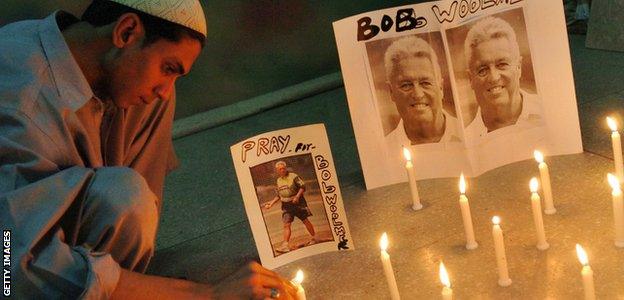
A Pakistan cricket fan remembers Bob Woolmer
Woolmer's final interview
I interviewed Bob after the three-wicket defeat by Ireland -, external it was the last interview, external he ever gave.
He was under no obligation to give me a one-to-one interview, but I had a good relationship with him and such was his affable nature that even in the depths of disappointment he was happy to talk.
He said he was going to leave his job, but I sensed he didn't want to announce his resignation via the media, and he kept saying he wanted to "sleep on it".
He didn't seem any more downcast or stressed than any other coach, and there was nothing to indicate he was not well at that moment - and certainly no sign of a severe cough which had been described by others close to him., external
Rumours and conspiracy
When police stated the initial findings of the autopsy were "inconclusive", the conspiracy theories started.
Three nights after Woolmer had died, Jamaican police announced they were treating his death as suspicious. Two nights after that, they declared it was murder.
All sorts of rumours began to circulate about match-fixing, poison, murder by an angry fan or religious zealots, and even suggestions that members of the Pakistan team could have been involved.
It was a murder investigation that ultimately unearthed nothing. Three months after Woolmer's death, police did an about-turn and stated they believed the coach died of natural causes.
In November 2007, the jury at an inquest returned an open verdict.
So why was a murder investigation opened?
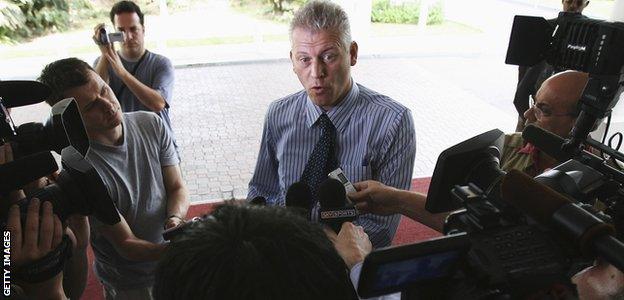
Mark Shields led the local police investigation
The man leading the investigation was British-born Mark Shields, the then-deputy commissioner of Jamaican police.
His gut instinct when he first arrived at the Pegasus on the morning Woolmer died was that the death was a result of natural causes.
"It was quite clear he had been very ill, probably struggling for breath," recalls Shields.
"It would have been a very distressing time for him just before he died, but there was nothing to show any forced entry. There was no indication it would be anything other than natural causes at that stage.
"But of course when you are given the hammer blow from the pathologist that, in his opinion, Bob was strangled... that changed the whole thing completely.
"The pathologist's report said the hyoid bone (in the throat) was broken. So that's a good indication that he'd been strangled.
"My question was, where is the bone? Can we see the bone? Has it been X-rayed? That hadn't happened. So we went back and managed to extract the bone from his body and have it X-rayed.
"That showed it wasn't broken at all and it was at that stage we went into a higher gear in terms of getting second, third and fourth opinions."
'Family told their lives might be in danger'
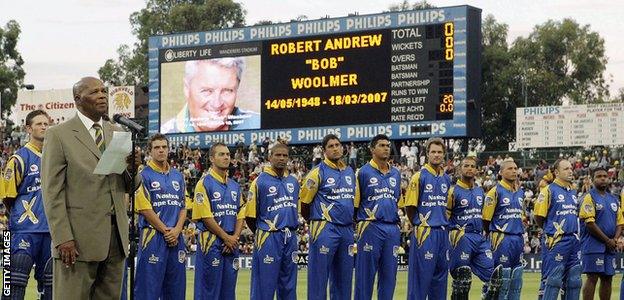
Remembrance services were held throughout the world for Bob Woolmer - this one being in South Africa
Woolmer's older son Dale was 27 when his father died.
He was advised not to travel to Jamaica at the time of his father's death because of the media frenzy.
Instead he flew to Cape Town to be with his mother Gill and younger brother Russell. He was in the air when police announced a murder investigation.
The first Dale knew of it was when he saw a BBC News headline flash up on the screen in the headrest in front of him: 'Breaking news - Murder at the World Cup'.
A million questions raced through his head. The flight seemed to take an eternity. It changed everything.
"My brother told me when I landed, 'the police will pick you up - our lives might be in danger'," Dale says. "We then travelled home to be met by a large media storm outside the house. Wherever we travelled in Cape Town, every news station, TV, newspaper, had a story about my father."
Meanwhile, back in Kingston, the Pakistan players were at the centre of their own media storm as they came to terms with the loss of their coach, and implications from some media sources they could have been involved.
"I remember we all cried on that day and we couldn't control our emotions," says Mushtaq Ahmed, who was assistant coach under Woolmer. "I think he was the best coach at that time."
Mushtaq's view was shared by many within the game. Woolmer's coaching manual - 'The art and science of cricket' - was described as "trailblazing" when it was released.
He is widely credited with making the reverse-sweep a popular shot among batsmen, while his technology-led innovations were ahead of their time.
Most notably, he tried to introduce the use of earpieces between captain and coach, external after seeing the method used in other sports.
Read: Woolmer second on world's best cricket coaches list (external website), external
'You wonder if you're next on the hit-list'

The Jamaica Pegasus hotel where Woolmer was found unconscious
Pakistan's physical trainer Murray Stevenson became the liaison for the Woolmer family and had to formally identify the body.
He and the team's physiotherapist - fellow South African Darryn Lifson - were close to Woolmer.
Stevenson recalls that after police announced death by strangulation, he and other members of the Pakistan backroom staff realised they were living in an environment where a murderer was supposedly on the loose.
"At the back of your mind you wonder, are you next?" said Stevenson.
"If there was some sort of information these guys were after, would they think we had information too? Were we going to be next on their hit-list, as it were?
"We were dealing with the death, but also wondering the degree to which we were at risk."
During all this, the World Cup carried on. Players staying in the Pegasus Hotel were fingerprinted and DNA swabs taken as investigators gathered evidence.
Pakistan played Zimbabwe three days after Woolmer's death.
Captain Inzamam-ul-Haq - a survivor of the victorious 1992 World Cup-winning team - had announced his one-day-international retirement, external on the night Woolmer died.
I remember his hulking shoulders shaking as he dissolved into tears upon leaving the field for the last time.
The World Cup's over but speculation continues
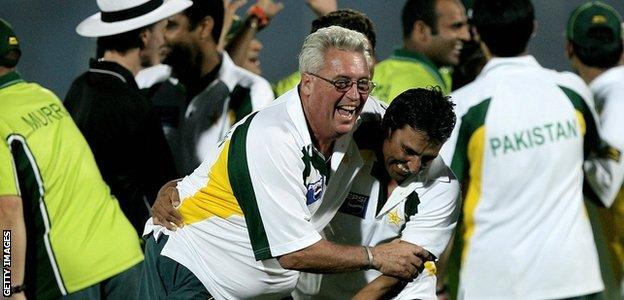
Bob Woolmer led Pakistan to a Test series victory over an England team who were fresh from winning the 2005 Ashes
It was later in the timeline that poison was suggested as a possible cause of Woolmer's death.
The pathologist who had conducted the autopsy in Kingston was Dr Ere Seshaiah. At the inquest later in the year, Seshaiah's methods were criticised by other expert pathologists.
South African pathologist Professor Lorna Martin testified and recalled that on reading the initial autopsy report, she believed it was murder by manual strangulation.
However, on examining the evidence first hand, she was convinced it was natural causes.
"There was natural pathology in the body that could easily account to his death being related to a cardiac event," said Martin.
After admitting he was wrong about the hyoid bone being broken, Seshaiah testified that the reaction from Woolmer's body at the time of his death was indicative of the consumption of the insecticide cypermethrin.
Fitzmore Coates - the acting chief forensic officer at the Jamaican government's forensic science laboratory - testified that the levels of cypermethrin found in Woolmer's stomach contents were "significant".
This was contradicted by Professor Tara Dasgupta, head of the Pesticide Research Laboratory at the University of the West Indies, who stated that new tests found no traces of cypermethrin.
Shields visited the mortuary where Woolmer's body was kept and saw a can of fly spray - the household use for cypermethrin - resting on a shelf behind Woolmer.
He believes someone fumigated the room and that is how low levels of the insecticide may have crept into some samples. He did not believe there was enough of the poison to kill a man.
"Neither murder nor natural causes could be proven," Stevenson adds.
"There were lots of question marks around some of the procedures and equipment that had been used in the testing of the blood etc.
"I managed to chat to some of the guys from Scotland Yard - who Mark Shields had brought out - and from what they said, it was very much natural causes. That gave me a bit more peace of mind and a bit of closure, I suppose."
Accepting the findings and moving on
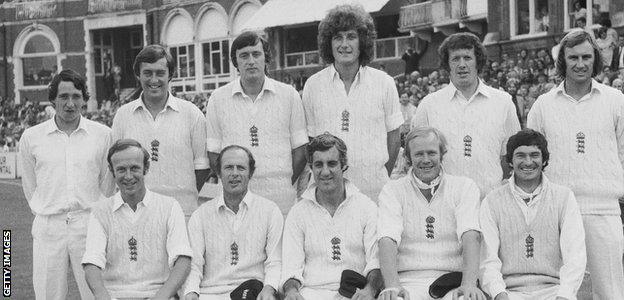
Woolmer (back row, second left) scored all three of his Test centuries against Australia
Some have always believed there was foul play involved in Woolmer's death, most notably his close friend Clive Rice who passed away in 2015 from cancer.
Shields, though, is as unequivocal today as he was at the inquest 10 years ago.
"I have no doubt," he said. "It was a question of finding the evidence that Bob wasn't murdered.
"That all went on prior to the inquest. The jury of course came back with an open verdict, which in some ways I find disappointing, but that's what juries are for. If they weren't sure, then an open verdict was far better than an unlawful killing."
The family has also accepted Shields conclusion.
"We don't have any questions," says Dale Woolmer. "I'm absolutely sure that it was heart disease, because of type 2 diabetes. There's no reason for us as a family to think anything else.
"I don't think it's wrong of people to question that though. If I didn't have the information from Mark Shields, I would be more inclined to believe what the media reported. I don't blame anyone."
'I had a good, old cry'
As a relatively young reporter - and one who was covering their first World Cup - the fortnight after Woolmer died remains the most testing period of my career.
I travelled to the Caribbean to cover cricket and ended up reporting on the apparent murder of someone I knew.
The enormity of it all only really hit me after my reporting of the story was done and I was told I could fly home.
After an intense whirlwind of grabbed interviews, of watching and waiting, of hastily arranged press conferences, of sorting fact from rumour, and thinking there was a murderer on the loose in the vicinity, I remember putting my head on my laptop and having a good cry.
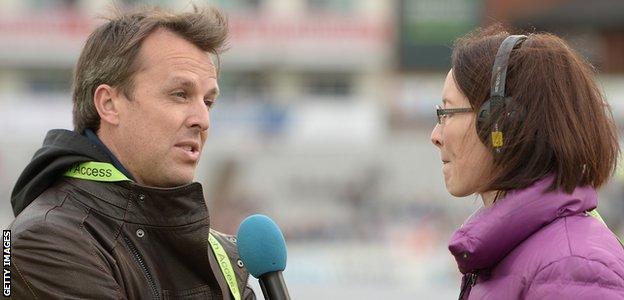
Alison Mitchell has also covered the Olympics, Wimbledon and the Open golf in her broadcasting career
Remembering a husband, father and grandfather
Dale has kept all the newspaper cuttings surrounding the story from 10 years ago.
He and his brother have four children between them - four grandchildren to Bob - and Dale recognises that whilst it was a tremendously painful episode at the time, the story itself will form an extraordinary part of their family history.
"When the time is right, and they're old enough to understand what happened, I will show them all the clippings, all the interviews," he explains. "It will be very interesting for them to understand who their grandfather was.
"I tell them he was like Joe Root; he played for England, he batted for England. I hope to get across to them that he worked incredibly hard.
"Number one was family - mum and us. Close proximity was cricket. It was everything he'd come to know. He had a deep passion for everything involved in cricket.
"He may have thought of himself as maverick - the earpiece to name but one. He always tried to think outside the box and come up with new ways to challenge the traditional views of the game.
"The coach side of him though I didn't know as well as the father side of him. As a father, he was really easy going. As long as we were behaving and looking after mum, it was fine."
A father, a coach, a cricketer, a friend. Bob Woolmer was so many things to so many people. His memory will always be cherished.